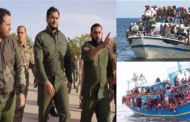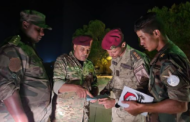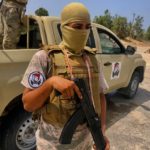Commander of Al-Karama Main Operations Room of the Libyan National Army (LNA), Lieutenant-General Saqr al-Jarushi, announced the area from Wadi Jarif to Al-Washka west of Sirte as a military operations area.
On the international level, President Abdel Fattah el-Sisi of Egypt warned on June 20 that his army is ready for intervention in Libya if the Turkey-backed forces of the internationally recognized Libyan government in Tripoli cross the ‘‘red line’’ of Sirte and Jafra airbase.
SIRTE
- commander of Al-Karama Main Operations Room of the Libyan National Army (LNA), Lieutenant-General Saqr al-Jarushi, announced the area from Wadi Jarif to Al-Washka west of Sirte as a military operations area. Al-Jarushi called on all citizens not to be in this area, with caution, according to a statement on June 17 by LNA Spokesman, Major General Ahmed al-Mismari;
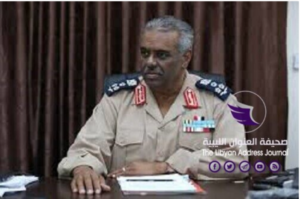
- the Spokesman for the Sirte/Jafra Operations Room, Abdulhadi Darah, has confirmed the death of three innocent citizens of the Qadhadafah Tribe in the Jarif area in western Sirte, due to the explosion of a land mine set by the Russian Wagner Group. Darah confirmed in a statement on June 15 that the Wagner mercenaries had planted mines in residential homes close to areas of military engagement, including Wadi Jarif.
INTERNATIONAL RELATIONS
- Egyptian Foreign Minister, Sameh Shoukry, said on June 21 that Turkey’s “deployment of militias in Libya represents a threat to Egyptian national security.” Cairo seeks a political solution in Libya in order to end the military conflict and enter a transitional phase, then to move to elections, Shoukry added in press statements, pointing out that foreign interventions in Libya “represent a threat to Egyptian and Arab national security”. The Egyptian minister stressed the need for Arab states’ support to Libya, in order to ensure a ceasefire in the country and the elimination of terrorism;
- the Deputy to the United Nations High Commissioner for Human Rights, Nada al-Nashif, confirmed that Haftar’s attack on Tripoli has led to a serious deterioration in human rights and the humanitarian situation in Libya generally. Al-Nashif added in a speech to the Human Rights Council on June 21 that the fierce attack on Tripoli had forced 225,000 people to flee their homes, indicating that there are at least a million people in Libya in serious need of humanitarian assistance. She reiterated her call for an immediate ceasefire and added that ending the fighting and returning to the political track is the only way to save lives and end the suffering of innocent civilians in Libya;
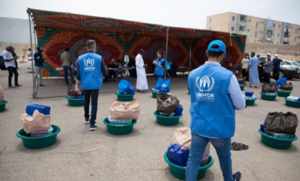
- the Turkish Presidential spokesman Ibrahim Kalın said reaching a permanent ceasefire in Libya would require Khalifa Haftar’s forces to withdraw from Sirte. Ibrahim Kalın told AFP on June 20 that Turkey supports the position of the UN-recognized Government of National Accord (GNA) in Tripoli and said that a ceasefire would be possible only if everybody went back to their 2015 positions, saying Sirte and Jufra needed to be evacuated by Haftar’s forces for a “sustainable ceasefire.”;
- Diplomatic Advisor to the King of Bahrain, Khalid bin Ahmed, on June 20 has expressed his country’s support for Egypt’s stance towards the crisis in Libya, after Egyptian President Abdel Fattah el-Sisi speech on possible Egyptian military intervention in Libya in response to the Turkish direct support of the Islamist groups in Western Libya;

- President Abdel Fattah el-Sisi of Egypt warned on June 20 that his army is ready for intervention in Libya if the Turkey-backed forces of the internationally recognized Libyan government in Tripoli cross the ‘‘red line’’ of Sirte and Jafra airbase. “Be ready to conduct any mission, here inside our borders – or if necessary, outside our borders,” he told the gathered troops;
- Turkish Vice President Fuat Oktay said on June 19 that cooperation between his country and the United States (US) in the case of the Libyan file has gained depth, which may make a positive difference. Oktay stressed, during the meeting of the American Chamber of Commerce and the American-Turkish Business Council, that “the firm and principled position, taken by Turkey in Syria and Libya had broken the resolve of the enemies and terrorist organizations”. He further added, “We are deepening our bilateral talks on Libya, as was discussed during a phone call on June 8 between President Recep Tayyip Erdogan and the President of Donald Trump, where it was agreed that Turkey and the US could jointly make a positive difference;
- Turkish Foreign Minister, Mevlut Cavusoglu has said they are ready to work with Italy to achieve a lasting peace in Libya. “Rome did not support the putschist Haftar like other European countries,” Cavusoglu said at a joint press conference on June 19 with his Italian counterpart, Luigi Di Maio. The Italians, for their part, are calling for a political solution in Libya and to support the United Nations efforts to bring peace to the country, according to Di Maio. He stressed their rejection of any mercenary activities in Libya. Di Maio also praised Turkey’s efforts in ending the conflict and bringing peace and stability in Libya;
- the Egyptian President, Abdel Fattah el-Sisi, affirmed that the Egyptian efforts in the Libyan file aim to restore the role of state institutions and fill the power vacuum institutionally, “whose absence led to giving space to the presence of armed militias and increasing their activity”;
- Egyptian President Abdel Fattah el-Sisi affirmed on June 18 that the presence of militias in Libya threatens to turn the country into a hotbed of tension in the region, which could extend into Europe;
- the Foreign Minister of Malta, Evarist Bartolo, has called on the European Union (EU) and the United States (US), to establish a coalition which could win the confidence of Libyans and assist them in ending the war;
- the Turkish Foreign Minister Mevlut Cavusoglu said on June 18 the United States started to have a more viable role in Libya, saying Recep Tayyip Erdogan and Donald Trump had reached a common ground regarding the Libyan crisis;
- Russian Foreign Minister Sergey Lavrov welcomed on June 17 the United States’ use of its influence in Libya in an effort to stop the fighting and launch a political process in the country. Lavrov stressed that the impact of the U.S. on both sides of the conflict there would be positive;
- Turkey’s violation of the United Nations arms embargo is the “main obstacle” to peace in Libya, the French Foreign Ministry said on June 17. France also accused Turkey’s navy on of acting in a hostile and unacceptable manner towards its NATO allies to prevent them from enforcing a United Nations arms embargo on Libya;
- the United Arab Emirates’ Minister of State for Foreign Affairs, Anwar Gargash, has delivered rare criticism of their ally Khalifa Haftar after he suffered major battlefield defeats at the hands of the internationally recognized Government of National Accord (GNA), Bloomberg reported;
- the African Union (AU) has called on the United Nations Security Council (UNSC), to take definite measures to implement a permanent ceasefire throughout the African continent, particularly in Libya;
- the US has welcomed the Government of National Accord’s call to establish an international fact-finding mission in order to document the violations in Libya and identify perpetrators from all parties to the conflict;
- the Arab League announced that the Cairo initiative declared by Egypt to end the crisis in Libya opens the door to opportunities for a political settlement. The Deputy Secretary-General of the Arab League, Hussam Zaki, indicated on June 17 that Turkey is hiding behind its agreement with Fayez al-Sarraj government (GNA) in Tripoli, with the aim of achieving economic, political and military interests;
- UNSMIL said on June 16 that it was concerned about the arrest, detention and ill-treatment of a large number of Egyptian nationals in the city of Tarhuna in potential violation to Libya’s international human rights law obligations on the prohibition of torture, inhuman and degrading treatment or punishment;
- the British Minister of State for Middle East and North African Affairs (MENA), James Cleverly, confirmed on June 16 that there is not solution in Libya other than a political one;
- the Turkish Presidential envoy to Libya, Emrullah Isler, said that all political negotiations in Libya must be led by politicians, adding that Aquila Saleh falls into that category and therefore, should contribute to the process;
- Russian Foreign Minister, Sergey Lavrov, called on June 16 on the need for all parties in Libya to sit to the negotiating table without preconditions, pointing to Russia’s communication in particular with Turkey. After meeting in Moscow with his Iranian counterpart, Mohammad Javad Zarif, Lavrov said, “We must talk to all parties to the conflict in Libya and invite them to sit at the negotiating table without preconditions”;
- NATO Chief Jens Stoltenberg said on June 16 the bloc was concerned over reports of mass graves in Tarhouna, calling for a UN investigation into such violations in Libya. Stoltenberg said NATO was also concerned about the increased Russian presence in the eastern Mediterranean in general; in Syria and in Libya;
- Turkey shot back on June 16 at “unacceptable” criticism from France over its armed support for the government in the Libyan capital Tripoli, accusing Paris of being an obstacle to peace;
- the US Secretary of State Mike Pompeo said on June 15 it is time Libyans and other parties have worked on preventing Russia or any other country from meddling in the internal affairs and sovereignty of Libya for their own gains and benefits.



